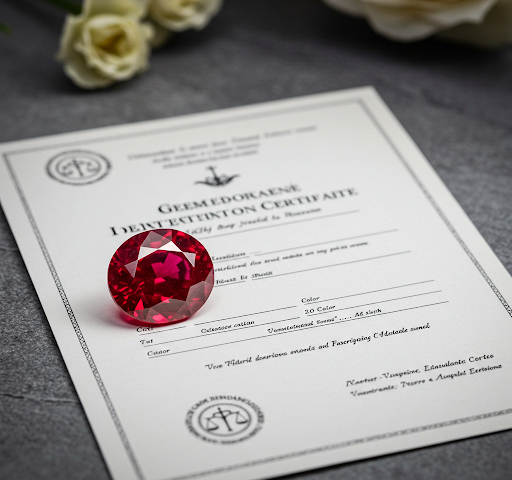
Agarwood Incense: “Sacred Smoke” – Spiritual Practices and Benefits
March 18, 2025
Agarwood Oil Benefits: “Elixir of Life” – Health and Wellness Uses
March 20, 2025Hello friends, I’m Chuong Gems from Vietnam. Today, I’d like to share with you essential information about gemstone identification certificates – a crucial aspect of the gemstone industry that every collector and buyer should understand.
Introduction to Gemstone Identification Certificates
A gemstone identification certificate is an official document issued by a recognized gemological laboratory that verifies the authenticity and characteristics of a gemstone. These certificates serve as a guarantee of the stone’s identity and quality, providing crucial information about its properties.
Common Types of Gemstone Certificates
Several respected organizations issue gemstone certificates worldwide:
- GIA (Gemological Institute of America) – Considered the global standard in gemstone certification
- IGI (International Gemological Institute) – Known for their comprehensive diamond grading
- SSEF (Swiss Gemological Institute) – Respected for their scientific approach to gemstone testing
- GRS (Gem Research Swisslab) – Specialized in colored stone certification
The Certification Process
The process of obtaining a gemstone certificate involves several careful steps:
- Initial inspection and cleaning of the stone
- Detailed testing using advanced gemological equipment
- Analysis of physical and optical properties
- Documentation of all findings
- Final review and certificate issuance
Why Are Gemstone Certificates Important?
Certificates play a vital role in the gemstone market for several reasons:
- Authentication – They confirm the genuine nature of the stone
- Value Assessment – They help determine the fair market value
- Consumer Protection – They protect buyers from fraud and misrepresentation
- Resale Value – They make it easier to resell stones in the future
How to Read and Understand Gemstone Certificates
When examining a certificate, pay attention to these key elements:
- Stone Identification – The type and variety of the gemstone
- Weight and Measurements – Precise dimensions and carat weight
- Treatment Information – Any enhancement procedures applied to the stone
- Origin – The geographical source of the gemstone (if determined)
- Quality Characteristics – Color, clarity, and cut grades where applicable
Important Considerations When Buying Certified Gemstones
As someone with experience in the gemstone industry, I recommend keeping these points in mind:
- Verify the Lab’s Reputation – Always check the credibility of the issuing laboratory
- Check Certificate Authenticity – Most reputable labs offer online verification services
- Match the Stone to the Certificate – Ensure the stone matches all specifications listed
- Consider Recent Certificates – Older certificates may not reflect current grading standards
- Keep Certificates Safe – Store your certificates in a secure place, as they are valuable documents
Remember, while certificates are essential, they should be used as a tool alongside professional advice and your own judgment when making purchasing decisions. As always, I recommend working with trusted dealers who provide proper certification for their stones.




